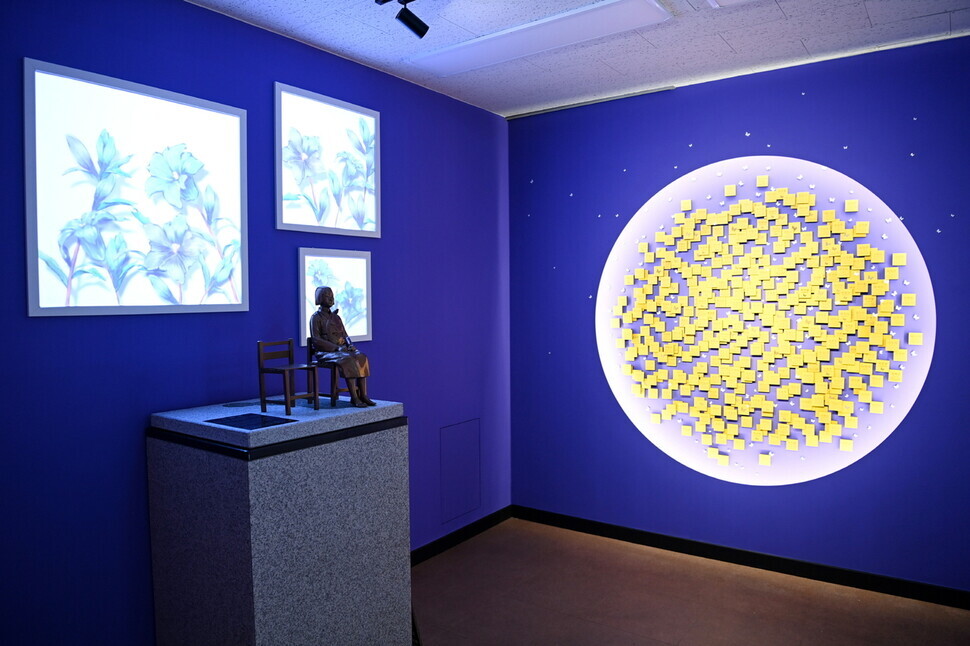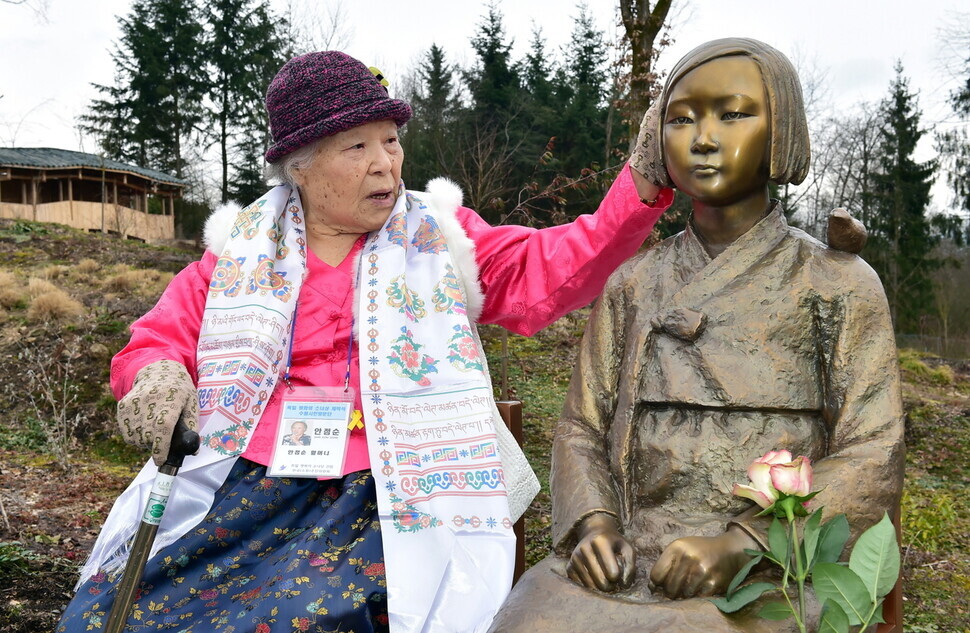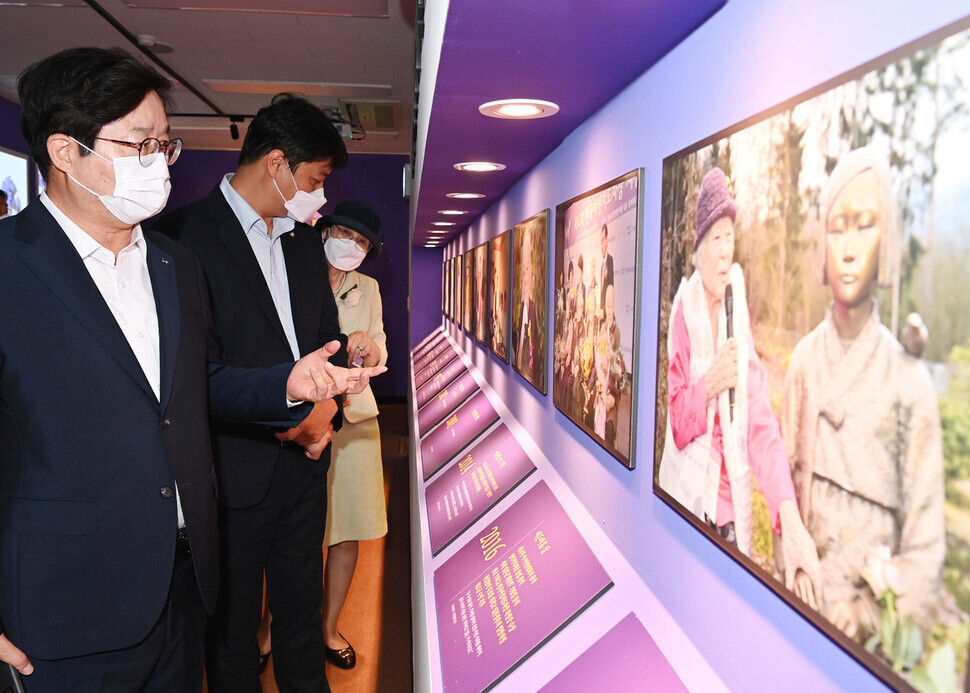hankyoreh
Links to other country sites 다른 나라 사이트 링크
Suwon to open memorial for “comfort women” victim

Ahn Jeom-soon was one of the “comfort women,” women forced into sexual slavery by the Japanese military during World War II. Before she died in 2018, she said, “Even now, this could all be ended by an apology, just a single word.”
“No amount of money is going to give me back my youth. What I want is just to hear one word [of apology],” Ahn said.
Ahn may not have gotten the apology she sought from Japan before her death, but now a memorial has been opened in her honor.
Suwon officials announced on Wednesday that it had completed work on a “room of memory” for Ahn at the city’s Family Women’s Hall. The memorial will be opened to the public on Sept. 1.
The memorial, housed in a 48 square meters art exhibition space in the cultural center on the building’s first floor, highlights Ahn’s life and experiences with the goal of ensuring that people don’t forget what has happened.
Ahn Jeom-soon’s Room of Memory is the first memorial or exhibition space to be named for one of the former comfort women.

“Soony,” as she was known as a child, accompanied her mother to an assembly of girls in a certain age group that had been organized in the Boksa neighborhood of Seoul’s Mapo District, during Japan’s colonial occupation of Korea. Soon, she found herself on a truck, being driven away from her mother.
Ahn said she was taken to Pyongyang and then to Beijing and Tianjin, in China. She finally arrived at a lonely building in a desert of yellow sand.
“If we didn’t do as the Japanese soldiers said, they threatened us with their swords. We were treated no better than animals. I can’t even explain how awful it was,” she said.
An old-fashioned mirror was installed at the memorial, inspired by Ahn’s testimony. When visitors stand in front of the mirror, they’re shown a video that sheds light on her experience.
After suffering such horrible abuse, Ahn was finally reunited with her family after the end of World War II. Her awful scars and privation produced a social anxiety disorder that drove Ahn into seclusion until 2002, when she was 75 years old.
Thanks to the efforts of a group that supports the former comfort women, Ahn began to meet with other survivors and talk about her own experiences.
The various photographs displayed at the memorial highlight Ahn’s leading role in the peace movement in the Suwon area and allow visitors to reflect upon her testimony and the life she led.

The memorial contains an interactive section. Visitors who place a letter in the mailbox after viewing the exhibition will receive a reply containing words to remember by Ahn and other former comfort women.
There’s also a piece of artwork by Kim Seo-kyung filled with yellow squares listing the names, ages, and testimony of more than 400 former comfort women.
The memorial displays a small statue of a young girl, representing the comfort women, that was donated by an association of residents in an apartment located in Suwon.
By Hong Yong-duk, South Gyeonggi correspondent
Please direct comments or questions to [english@hani.co.kr]

Editorial・opinion
![[Column] Life on our Trisolaris [Column] Life on our Trisolaris](https://flexible.img.hani.co.kr/flexible/normal/500/300/imgdb/original/2024/0505/4817148682278544.jpg) [Column] Life on our Trisolaris
[Column] Life on our Trisolaris![[Editorial] Penalties for airing allegations against Korea’s first lady endanger free press [Editorial] Penalties for airing allegations against Korea’s first lady endanger free press](https://flexible.img.hani.co.kr/flexible/normal/500/300/imgdb/original/2024/0502/1817146398095106.jpg) [Editorial] Penalties for airing allegations against Korea’s first lady endanger free press
[Editorial] Penalties for airing allegations against Korea’s first lady endanger free press- [Editorial] Yoon must halt procurement of SM-3 interceptor missiles
- [Guest essay] Maybe Korea’s rapid population decline is an opportunity, not a crisis
- [Column] Can Yoon steer diplomacy with Russia, China back on track?
- [Column] Season 2 of special prosecutor probe may be coming to Korea soon
- [Column] Park Geun-hye déjà vu in Yoon Suk-yeol
- [Editorial] New weight of N. Korea’s nuclear threats makes dialogue all the more urgent
- [Guest essay] The real reason Korea’s new right wants to dub Rhee a founding father
- [Column] ‘Choson’: Is it time we start referring to N. Korea in its own terms?
Most viewed articles
- 160% of young Koreans see no need to have kids after marriage
- 2New sex-ed guidelines forbid teaching about homosexuality
- 3Presidential office warns of veto in response to opposition passing special counsel probe act
- 4How daycares became the most viable business for the self-employed
- 5[Column] Life on our Trisolaris
- 6Months and months of overdue wages are pushing migrant workers in Korea into debt
- 7[Guest essay] Maybe Korea’s rapid population decline is an opportunity, not a crisis
- 8Bills for Itaewon crush inquiry, special counsel probe into Marine’s death pass National Assembly
- 9OECD upgrades Korea’s growth forecast from 2.2% to 2.6%
- 10Gangnam murderer says he killed “because women have always ignored me”